









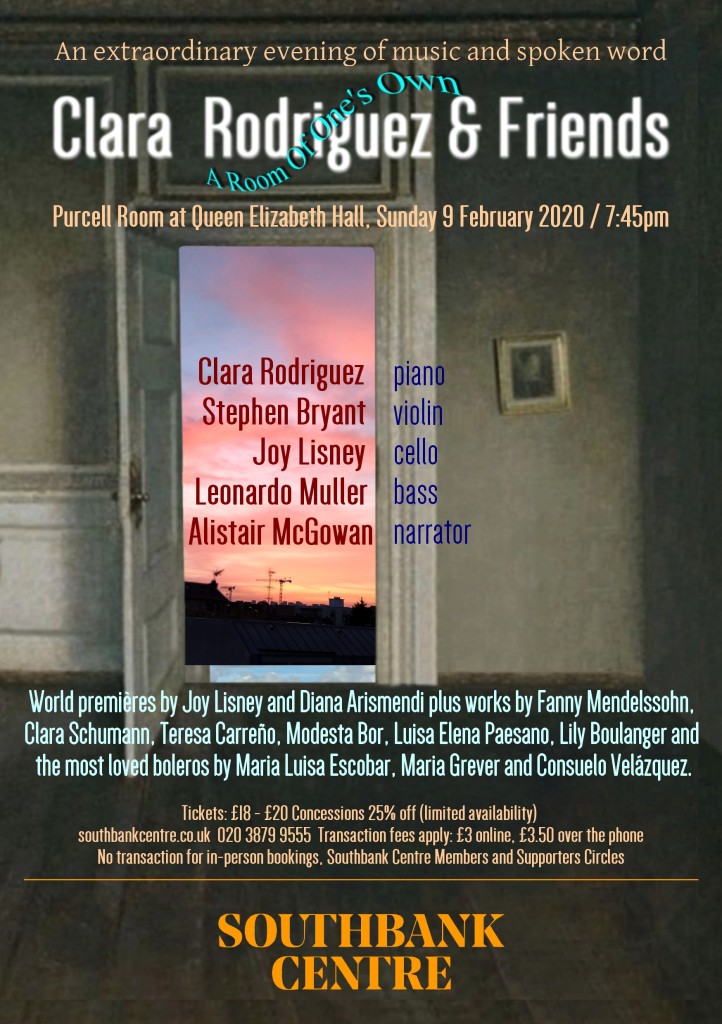











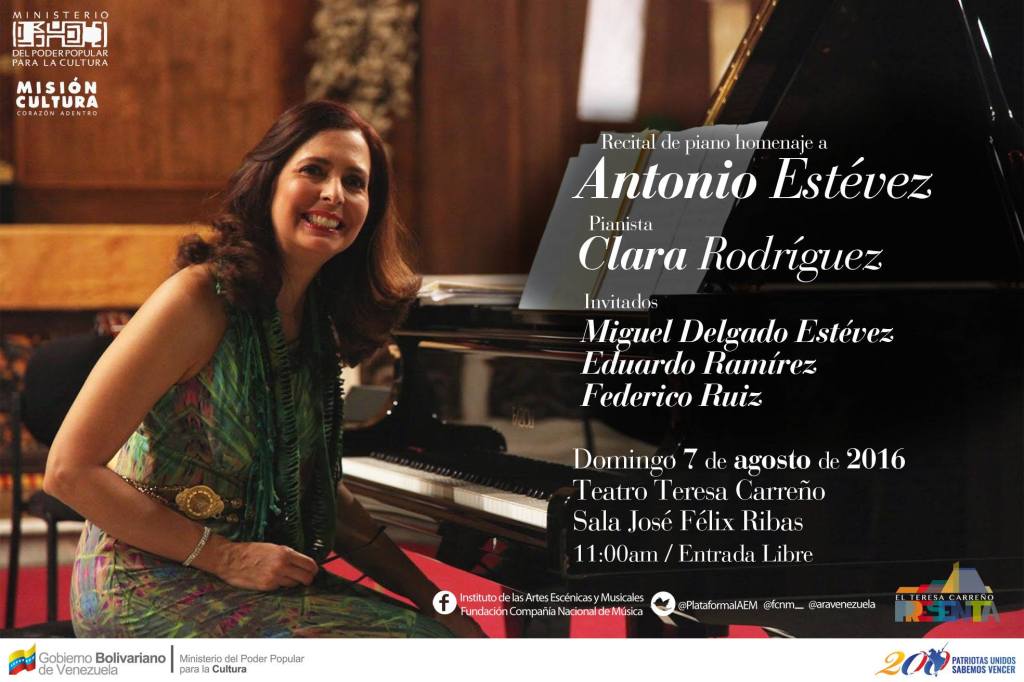






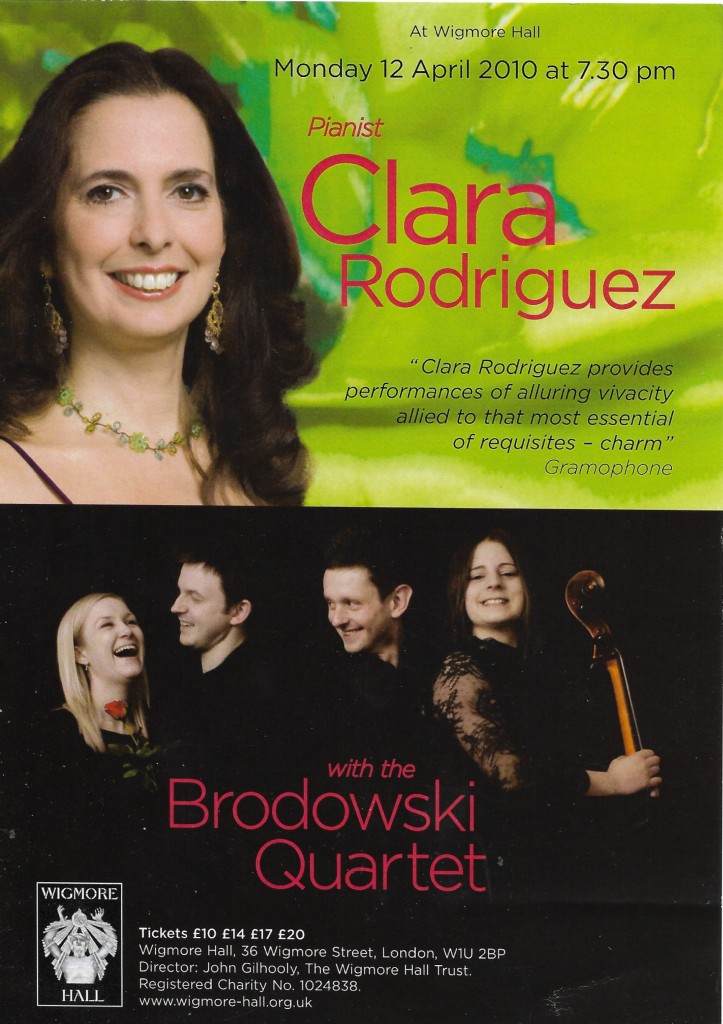



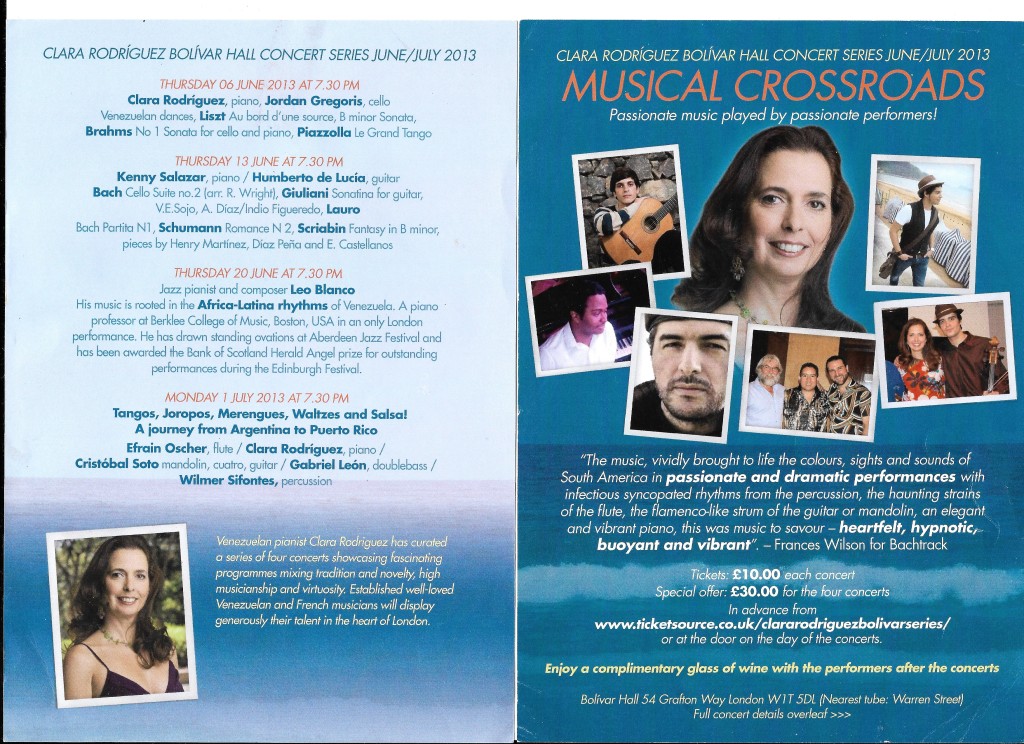
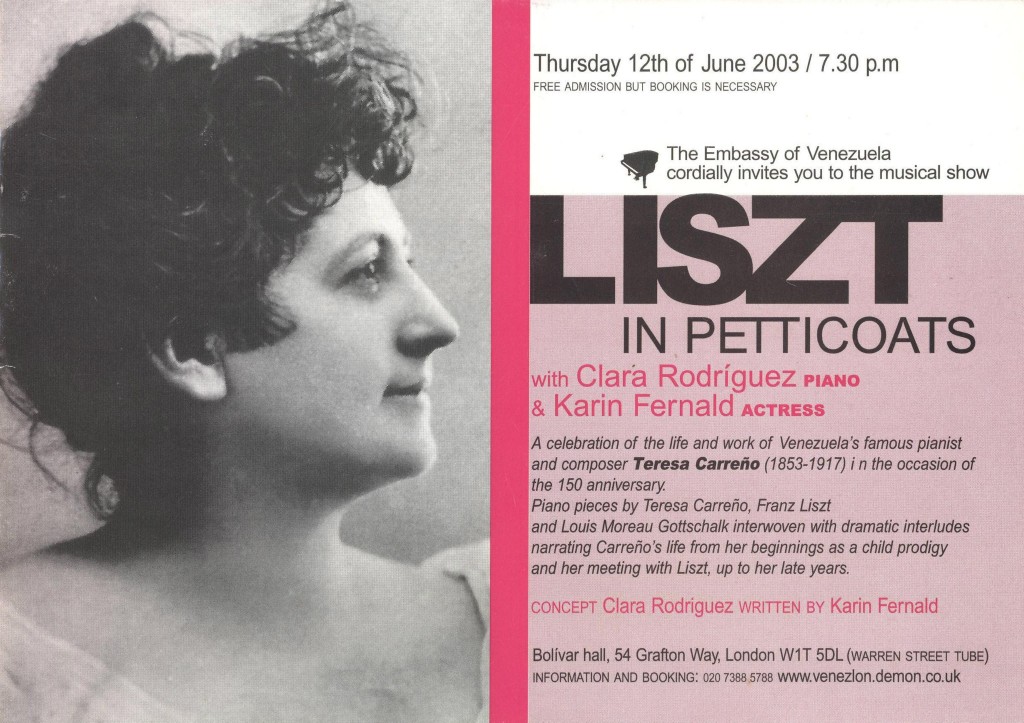
Photography by Antolín Sánchez, Jean-Luc Muller, Teatro Teresa Carreño, Andrés Landino, Chantal Rosa-Cobián.
Designs by Carlos David @carlosdavidoo , Frances Wilson, Gabriella Bello, María Teresa García.
 Written and compiled by Clara Rodriguez
Written and compiled by Clara Rodriguez
Staged in Caracas in July 2011
Characters:
· Pianist: Clara Rodriguez
· Actress: Caridad Canelón
· Narrator: Miguel Delgado-Estévez
Clara enters in darkness and sits at the piano, a dim light becomes stronger gradually and she starts to play the Concert Study No. 3 “Un sospiro” by Franz Liszt
ACTRESS: Franz Liszt, was a Hungarian composer and pianist who has been described as the first rockstar. His extraordinary success led to terms like Lisztomania and Liszt Fever due to the hysteria produced by his public appearances.
NARRATOR: At the time of his birth, in Vienesse cafés, Beethoven talked to his friends of Bolívar’s triumphs in Latin America, it was the year of the signing of the first Constitution of the Republic of Venezuela, it was the year of The Great Comet of 1811, times of change and wars in Europe, although his birthplace, Raiding, had barely become Hungary, it had been beforeTurkish territory. It was still a feudal country where the Lords lived in luxury.
ACTRESS: His father, Adam, worked for the Esterhazy royal family where concerts were the main activity . Haydn took care of the programming for 30 years
NARRATOR: Liszt heard in his childhood lots of classical music and used to also love listening to the music Gypsies played near his home.
ACTRESS: At the at age of 9, he played his first concert despite having malarial fever. The listeners were impressed. A subsequent concert secured him a scholarship that enabled him to travel to Vienna. There, he studied with Salieri and Czerny.
NARRATOR: Czerny with his disciplined method decided to teach him for free.
ACTRESS: They say, that in admiration, Beethoven kissed the hands of the young Liszt, although his detractors critized this saying that it was just part of the “hype” done for the young virtuoso.
NARRATOR: At 13 he sets his home with his parents in Paris, the most artistic capital of the time.
ACTRESS: Cherubini, then director of the conservatory, would not accept him as a student despite having prayed, cried and even submitted letters of recommendation from the Hungarian nobles and aristocrats. A sense of terrible failure invaded Franz and his father.
NARRATOR: Franz could anyway display his talent by playing many concerts thanks to these letters.In a few months he was considered the 9th. Wonder of the World!
ACTRESS: … Cherubini !!!
NARRATOR: At the age of 20 Liszt met three people who had a powerful influence on him: Paganini, Chopin and Berlioz.
ACTRESS: Paganini had invented a mysterious form of virtuosity. His compositions imitated the sound of thunder, the humming of the wind, laughter. His figure was amazing because it was just skin and bones, just his fingers looked very strong …
NARRATOR: One of the great ambitions of Liszt was to transcribe Paganini’s Capriccios for the piano.
ACTRESS: Liszt also reduced Beethoven nine symphonies for the piano thus helping later generations to know them.
ACTRESS: Then came the secret romance with the Countess Adele Laprumarede, something a little less passionate but successful.
CLARA PLAYS ADRIANA WALTZ by MIGUEL ASTOR
ACTRESS: Franz had amalgamated in his playing, classic old school with his new methods and virtuosic inventions. His attack and brilliance, speed and beauty of sound coupled with his intelligence and physical attributes had great effect on the Parisian salons, especially on the female audience.
NARRATOR: One of these ladies -friends with Berlioz- fell in love with the young Franz, Countess d’Agoult, who was married with three children. Liszt was 22, she was 28, blonde and goodlooking but with no sense of humor. Although she disliked music, her passion for Liszt blinded her, she would not take any consideration of the social consequences this relationship that lasted 10 years, would bring her. Some called them immoral, but for Liszt, it brought the necessary calm to begin developing his work as a composer.
ACTRESS: They were settlled in Geneva where Blondine was born. Franz taught at the conservatory. His appearance was still that of a teenager; his long hair was always a topic of conversation among his acquaintances, and in his index finger he wore a gold ring with a silver skull.
NARRATOR: A Punk teacher !!!
ACTRESS: Then they moved to Italy near Lake Como where Cosima was born in 1837.
NARRATOR: she was to marry Richard Wagner, in her adulthood, .
CLARA PLAYS “AU BORD D’UNE SOURCE” BY LISZT
ACTRESS: They then decided to move to Italy to read Dante and the Classics. The success achieved in this country, particularly in Milan, was brought down because of a series of articles Liszt wrote in the Paris Musical Gazette attacking what he saw as bad taste in the Italian musical world, for which he was declared persona non grata.
NARRATOR: The relationship with the Countess had begun to deteriorate, too much responsibility was now imposed by having a household with five children, he saw all this as an impediment in fullfilling his career and travels!. Reasons or excuses were repeatedly discussed :
ACTRESS: “Franz, last night after your concert, on the way home, you directed not one word to me, why are you so cold?” Why do you have to play all these benefit concerts that keep you away from us ?”
NARRATOR: In a letter Liszt writes:
“Marie! Marie! Let me repeat that name a hundred times, a thousand times. For three days it has lived inside me, oppressing and burning me … Heaven, hell, everything, everything in you and you … again, we live with all our experience, love, and all our woe!
The day you can tell me with all your soul, with all your heart, all your mind, “let us erase, forget forever, everything that is incomplete, painful, and distressing from the past; let us be everything to each other, because now I understand and forgive as much as I love you “– that day, and it may be soon, we will fly away from the world, we will live, we will love and die only for each other ”
ACTRESS: Those words belonged to a dying love.
NARRATOR: These two lives were like two out -of- tune pianos !!!
ACTRESS: She returned to Paris with the children … and he went on his globetrotting life to almost every corner of Europe.
CLARA PLAYS PETRARCH SONNET 104 by LISZT
ACTRESS: Medals, sabers and gold swords were offered, Liszt was acclaimed and beloved as much as the little Mozart was in his time.
NARRATOR: In a letter he says “Prague is the city that has the best taste in music. At this time the aristocracy is delighted with me; women are at my disposal, men give in to this situation with some humor “. Liszt made several tours in Russia with great success. At first, the audience saw him as an eccentric, there no one would have thought of appearing on stage flaunting such a mane, much less adorn the lapels with as many commendations, but all these speculations were forgotten when Liszt started playing, simply, they maddened under its spell .
ACTRESS: With his concerts he made much money and came to build a carriage that must have been almost a caravan where he had a room and a study that contained a piano.
NARRATOR: At this time his number of ties amounted to three hundred and sixty-five. A different one for each day of the year.
NARRATOR: Liszt avoided returning to Paris for a while not to meet Madame d’Agoult instead he was traveling the Mediterranean area, accompanied by his lover of the moment, Lola Montes.
ACTRESS: That wandering life and the indiscriminate popularity began to tire him “My life seems to be an endless search.
NARRATOR: “I feel I‘m marked by a heavy futility. Am I doomed to do this type of minstrel’s work for life?”
CLARA PLAYS VALS DESTILADO BY RICARDO TERUEL
NARRATOR: The Grand Duke Carl August of Vienna offered him the position of musical director of Weimar
ACTRESS: Before taking his post he would end one of his tours in Russia. In his last concert in Kiev he found a warm letter in his dressing room alongside 100 rubles.
ACTRESS: The next day in a thank you gesture to the sender … his life and destiny were sealed … once again.
NARRATOR: Her name: Princess Caroline Wittgenstein, eight years his junior, married but separated from a Russian billionaire Prince attached to the Tsar.
ACTRESS: A very serious person, avid reader and as religious as Liszt himself. She invited him to stay at her mansion where they were together for several weeks.
NARRATOR: Her plan was to sell the properties and divorce, but the government did not grant her permission to leave Russia, she managed to ran away to meet Liszt in the city where they would live for the next twelve years.
ACTRESS: Liszt was devoted to the composition and premiered as many operas as he could. He admired and supported Wagner of whom he said was composing the music of the future.
NARRATOR: Liszt also became a conductor and created the modern orchestra as we know it today. These were the years of the invention of the symphonic poems and works such as the magnificent Sonata in B minor.
Let’s listen to an excerpt of it
CLARA PLAYS approximately 10 ‘of the first part of the SONATA in B minor by LISZT
ACTRESS: After twelve years he was disappointed by how narrow minded Weimar was .
NARRATOR: “If I had only dedicated myself to please the taste of the big wigs the newspapers would not have insulted me as they have.”
ACTRESS: He found comfort in the love of the princess, music and religion; they had hoped to marry and so they made a trip to the Vatican. The wedding would be held on the 50th birthday of Franz’s, at St. Charles the Corsican. On the eve of the marriage an envoy of the Pope told them that she was still technically married in Russia and that her husband was opposed to the wedding.
NARRATOR: What a horrible disappointment suffered this pair of beings! They decided to live separately, but always maintained a close relationship to the end of their lives.
CLARA PLAYS CARMEN ROSA BY FEDERICO RUIZ
NARRATOR: Liszt, by the circumstances of his life, was often thrown into situations that had similarities with Faust, he also was Mephistopheles! He seemed to negotiate with false gods not always getting the desired results.
ACTRESS: In the last stage of his life he had the appearance of a magician apart, wearing clerical clothing. He went on to receive the Provincial Franciscan Order at the Vatican and produced a great amount of religious works.
NARRATOR: After living in an apartment in this exclusive “hotel” he was invited to the Villa d’Este where he spent time each year for twenty years. What he really would have liked was to be named musical director of the Vatican but his past-and present-shocked society in Rome.
CLARA PLAYS WALTZ No 1 BY JUAN CARLOS NUÑEZ
ACTRESS: The Duke of Weimar rehired him while the Hungarians invited him to create the Academy of Music in Budapest two invitations that he gladly received after his retirements in Rome he was feeling revitalized and free … a new princess awaited him though, widowed with children and very passionate. The Baroness Olga Meyendorff. But that was not the only Olga that would occupy part of his spirit, there was also Olga The Cossack.
NARRATOR: This young lady was not afraid of nature, hunted lions,tamed tigers, crossed the steppe on the back of her Arabian horses, was an anarchist, atheist, made animal dissections and without possessing the necessary talent also wanted to be a pianist … total failure !!!
ACTRESS: In her first meeting with Liszt she took a puff of a cigar and noting the figures of a Christ and a Virgin asked the teacher if “they” would not mind the smoke, Liszt replied:
NARRATOR: “My child, for them it is just another type of incense”
ACTRESS: Liszt wanted to end the relationship but…
NARRATOR: She appeared in his apartment in Budapest with a gun, wanted to kill him and kill herself. Liszt said that next to this girl George Sand was a shy schoolgirl.
CLARA PLAYS DANCE of the Gaucho Matrero BY ALBERTO GINASTERA
NARRATOR: a young North American piano student, AMY FAY, travels through Germany with the idea of studying with Liszt
ACTRESS: Tonight I went to the theatre and I’ve seen him! Liszt is the most handsome and interesting man imaginable. Tall and slight, with deep-set eyes, bushy eyebrows and gray hair, long, which he wears with a parting in the middle. His mouth turns up at the corners, giving him an intelligent Mephistophelian expression when he smiles, his whole appearence and manner have an almost Jesuit elegance. His hands are very narrow, with long fingers that seem to have more joints than other other people’s. They are so flexible and supple that just looking at them makes me nervous.
I have never seen such refined manners as his. When he stood to leave his box, for example, after his “adieux” to the ladies, he laid his hand on his heart and made his final bow, without exaggeration, just with a quite courtliness, which makes you think there is no other way to say goodbye to a lady!
THE ACTRESS WALKS ON STAGE , THINKING, THEN TO THE PUBLIC:
He is all spirit, but half the time it is, a mocking spirit! For the first lesson, I almost died when he called, “The American, to the ring” I played like I was possessed. He said “Bravo! You played with courage”
NARRATOR: He gives no paid lessons whatever, as he is much too grand for those little things! On the other hand, he can do some cruel things, for instance, he will rarely mortify anyone by an open snub, but he manages to let the rest of the class know what he is thinking while the poor victim remains quite in darkness about it!
NARRATOR: I remember him saying once “When I play, I always do it for the people in the gallery -he meant the cock-loft, where the rabble sit- so those persons who pay next to nothing also hear something” In his demonstration the sound didn’t seem to be loud, it was penetrating, far reaching.
ACTRESS: He never talks about technique in classes, only interpretation, but I remember the day he told me “Miss, please do not move your hands as if you were beating eggs to make an omelet,”
NARRATOR: One day, Princess Caterina was playing and he thought it was so abominable that he snatched the score and knocked it down. The princess, elegantly, did not alter but looked firmly at him and said:
ACTRESS: Now who‘s going to pick it up ?
NARRATOR: Well, Liszt had to stoop and pick it up, as a punishment he imposed himself to give the princess not one but two lessons!
ACTRESS: His nature is compassion, he is exquisite, GLORIOUS! no mortal can compare to LISZT.
CLARA PLAYS VALS POETICO BY ERNESTO LECUONA
NARRATOR: Liszt had other great and stormy love affairs and one day told his grandson: “The great success of my life was never having married.”
ACTRESS: Liszt was in Paris, almost 60 years of age and everyone knew he hated the notion of child prodigies
NARRATOR: “I have no time for those artists to be” ” these creatures never come to anything. “
ACTRESS: when he was introduced to a 12 year old girl from Caracas: Teresa Carreño who had been described by a critic as “Liszt in petticoats”. Against his will he heard the child and putting his hands on her head he said:
NARRATOR: “God has given you the greatest gift, he has given to you genius. Work hard and in time you will become one of us. “
ACTRESS: Teresa Carreño said she never forgot the weight of the hands of the great master over her head.
CLARA PLAYS MI TERESITA WALTZ BY TERESA CARREÑO
NARRATOR: “Always one single thought in my heart: To Die, always constant, that image is in my soul, to die. As my past, and future, my hope is to die, “
ACTRESS: For him, death is a curtain that goes up and lets light in. It is a haunting image, it is the true joy or sorrow present in his music.
NARRATOR: Liszt died in 1886 in Beyreuth pleased to have witnessed a successful production of Tristan.
CLARA PLAYS MEPHISTO WALTZ BY LISZT
ROOM IN TOTAL DARKNESS WITH THE FINAL CHORD
Photography by Antolín Sánchez
Por Clara Rodríguez
Puesta en escena en Caracas en Julio del 2011
Personajes:
· Pianista: Clara Rodríguez
· Actriz: Caridad Canelón
· Narrador: Miguel Delgado-Estévez
Clara entra en la oscuridad de la sala y se sienta al piano, una luz tenue se hace más fuerte poco a poco y comienza a tocar el Estudio de Concierto No. 3 “Un sospiro”de Franz Liszt
ACTRIZ: Franz Liszt, pianista y compositor húngaro, ha sido descrito como la primera estrella rock. Su éxito extraordinario dio lugar a términos como Lisztomanía y Fiebre Lisztiana debido a la histeria que producían sus presentaciones públicas.
NARRADOR: Nació el mismo año de la firma de la primera Constitución de la República de Venezuela –¡Bicentenario el Maestro! – , tiempos de cambios y guerras en Europa, aunque su lugar de nacimiento, Raiding, apenas acababa de convertirse en Hungría –antes era territorio turco-. Seguía siendo un país feudal en donde los Señores vivían en insensato lujo.
ACTRIZ: Su padre, Adán, trabajaba para los príncipes de Esteráis en donde los conciertos eran la principal actividad…Haydn se ocupó de la programación por 30 años
NARRADOR: Liszt escuchó en su niñez mucha música clásica y también a los gitanos que vivían cerca de su casa.
ACTRIZ: Tocó su primer concierto a los 9 años y a pesar de tener fiebre palúdica impresionó a los oyentes. Un concierto posterior le aseguró una beca con la que pudo viajar a Viena, la ciudad de Schubert y Beethoven. Allí estudio con Salieri y con Czerny.
NARRADOR: Czerny con su disciplinado método decidió ser su maestro gratuitamente.
ACTRIZ: Dicen que, en señal de admiración, el mismo Beethoven le besó las manos al joven Liszt, aunque sus detractores opinaron que no era más que … parte de la publicidad que se le hizo al joven virtuoso.
NARRADOR: A los 13 años se instala con sus padres en París, la capital artística de ese momento.
ACTRIZ: Cherubini, el entonces director del conservatorio, no lo quiso aceptar como alumno a pesar de haberle rogado, llorado e inclusive presentarle cartas de recomendación de los nobles y aristócratas húngaros. A su padre y a Franz les invadió un sentimiento de fracaso.
NARRADOR: De todas maneras Franz pudo darse a conocer tocando muchos conciertos gracias a dichas cartas. ¡ En pocos meses era considerado la 9na. Maravilla del mundo !
ACTRIZ: …¡¡¡ Ayy Cherubini !!!
NARRADOR: A los 20 años conoció a tres personajes que tuvieron una influencia impactante en él: Paganini, Chopin y Berlioz.
ACTRIZ: Paganini había inventado una forma de virtuosismo misterioso. Sus composiciones imitaban el ruido de los truenos, el zumbido del viento, la risa. Su figura asombraba porque era solo huesos y piel, solo sus dedos lucían muy fuertes …
NARRADOR: Una de las grandes ambiciones de Liszt era la de transferir al piano los caprichos para violín de Paganini.
ACTRIZ: De Chopin le impresionó su espíritu y poesía musical, solo le interesaba el piano como medio de expresión. La admiración mutua que sentían está reflejada en la biografía que Liszt escribió sobre el gran polaco en donde cuenta, entre muchas otras anécdotas, el día en que Chopin se apareció a tocar en uno de los salones parisinos luciendo una peluca rubia – imitándolo.
NARRADOR: También apreciaba profundamente el genio creativo, casi violento de Berlioz.. Le tomó un poco de tiempo asimilarlo pero estudió sus técnicas de composición y orquestación haciendo transcripciones para piano de obras como la Sinfonía Fantástica.
ACTRIZ: Liszt también redujo al piano las 9 Sinfonías de Beethoven, hecho que ayudó a las generaciones subsiguientes a conocerlas.
CLARA TOCA EL ESTUDIO No. 1 Op. 25 de CHOPIN
ACTRIZ: Liszt era un intelectual, a los 22 años le escribe a su amigo Pierre Wolf:
NARRADOR: “Hace 15 días mi espíritu y mis dedos trabajan como condenados: Homero, Lord Byron, Chateaubriand, Victor Hugo, Beethoven, Platón, Mozart, Bach y la Biblia están a mi alrededor … Los estudio, medito, DEVORO con furor; encima practico de 4 a 5 horas diarias de ejercicios, terceras, sextas, octavas, trémolos, notas repetidas, cadencias, etc.; ¡ Si no me vuelvo loco, me haré un artista !!!”
¡ También tuvo su primera decepción amorosa con su alumna Carolina de Saint Cricq!
ACTRIZ: (Dramatizando) ¡ Mi padre me ha prohibido que vea a Franz, también me he enterado que ha caído en un estado depresivo por varios meses que lo a llevado a dejar de presentarse en público por 2 años, hasta se llegó a publicar que había muerto …
NARRADOR: … y siguió creciendo el mito.
Ya en su lecho de muerte Adán Liszt le había advertido a su hijo: “Cuídate Franz, porque por lo que veo, las mujeres serán tu perdición”.
ACTRIZ: Luego vino el romance secreto con la Condesa Adele Laprumarede algo al parecer un poco menos ardiente pero exitoso.
CLARA TOCA EL VALS ADRIANA DE MIGUEL ASTOR
ACTRIZ: Franz había amalgamado, en su manera de tocar, la vieja escuela clásica con su nuevo método e invenciones virtuosísticas. Su ataque y brillantez, velocidad y belleza de sonido unidos a su inteligencia y atributos físicos tenían gran efecto en los salones parisinos, sobre todo sobre el público femenino.
NARRADOR: Una de estas damas –amiga de Berlioz- se prendó del joven Franz, la Condesa d’ Agoult, casada y madre de tres niños. Ella tenía 28 años y Liszt 22. Se dice que era rubia, buenamoza pero sin el menor sentido del humor. A pesar de que no le gustaba la música, la pasión que sentía por Liszt la cegó sin importarle las consecuencias sociales que le traería esa relación que duró 10 años. Algunos lo tildaron de inmoral, pero esa relación le dio la calma necesaria para comenzar a desarrollar su trabajo como compositor.
ACTRIZ: Se instalaron en Ginebra y allí nació Blondine. Franz daba clases en el conservatorio. Su apariencia era todavía la de un adolescente; su pelo largo fue siempre tema de conversación entre sus conocidos, y en su dedo índice lucía un anillo de oro con una calavera de plata.
NARRADOR: Punqueto el maestro!!!
ACTRIZ: Luego en Italia se instalaron cerca del Lago Como en donde en 1837 nació Cósima.
NARRADOR: quien se casara, en su edad adulta, con Wagner.
CLARA TOCA “AU BORD D’UNE SOURCE” DE LISZT
ACTRIZ: El éxito alcanzado en Italia, particularmente en Milán fue traído a menos por unos artículos que escribió en la Gaceta Musical de Paris atacando el mundo musical italiano, especialmente a Rossini, por lo cual fue declarado persona non grata.
NARRADOR: La relación con la Condesa había comenzado a deteriorarse,¡demasiada responsabilidad que imponían ahora cinco niños !, era un impedimento en la realización de su carrera y viajes. Se repetían razones o excusas por lo cual discutir:
ACTRIZ:“Franz, anoche después de tu concierto, camino a casa, no me dirigiste la palabra, ¿por qué tanta frialdad?” ¿Por qué tienes que ir a tocar todos esos conciertos de beneficencia que te alejan tanto de nosotros?”
NARRADOR: En una carta Liszt le escribe:
“Marie! Marie! Déjame repetir ese nombre cien veces, mil veces. Por tres días ha vivido en mi interior, oprimiéndome y quemándome… Cielo, infierno, todo, todo en tí y de nuevo en tí… , debemos vivir con toda nuestra vivencia, amor, y toda nuestra congoja!
El día en que puedas decirme con toda tu alma, con todo tu corazón, toda tu mente: “permitámonos borrar, olvidar para siempre, cada cosa incompleta, penosa, y acongojante del pasado; permitámonos ser todo para el otro, porque ahora te entiendo y perdono tanto cuanto te amo”- ese día, y puede ser pronto, volaremos lejos del mundo, viviremos, amaremos y moriremos el uno por el otro solamente.”
ACTRIZ: Esas palabras pertenecían a un amor que agonizaba.
NARRADOR: Sus dos vidas parecían dos pianos desafinados !!!
ACTRIZ: Ella regresó a Paris con los niños y él …siguió su vida de trotamundos prácticamente por cada rincón de Europa.
CLARA TOCA SONETO 104 del PETRARCA de LISZT
ACTRIZ: Medallas, condecoraciones, sables y espadas de oro le fueron obsequiadas.Fue tan aclamado y amado como el pequeño Mozart lo fue en su tiempo.
NARRADOR: En una carta dice ”Praga es la ciudad que tiene el mejor gusto musical. En éste momento la aristocracia está encantada conmigo; las mujeres están a mi disposición, los hombres ceden a ésta situación con cierto humor”. Liszt hizo varias giras en Rusia con gran éxito. Al principio, el público lo encontró un poco excéntrico, allí a nadie se le hubiera ocurrido llevar una melena semejante y mucho menos adornarse las solapas con cuanta condecoración hubiera pero todas éstas especulaciones eran olvidadas cuando Liszt comenzaba a tocar, sencillamente: enloquecían bajo su hechizo.
ACTRIZ: Con sus conciertos hizo mucho dinero y llegó a hacerse construir un carruaje que ha debido ser casi una caravana en donde había una habitación y un estudio que contenía un piano.
NARRADOR: En ésta época su número de corbatas ascendió a trescientas sesenta y cinco. Una diferente para cada día del año.
NARRADOR: No volvió a Paris por un tiempo para evitar encontrarse con Madame d’ Agoult y se quedó viajando por el área mediterránea, acompañado por su amante del momento, Lola Montes.
ACTRIZ: Esa vida errante y de popularidad indiscriminada lo empezó a cansar. ¨Mi vida parece que va a ser una infinita búsqueda.
NARRADOR: “Siento que estoy marcado por una inutilidad que me pesa.¿Es que estoy condenado a éste trabajo de juglar de por vida?”
CLARA TOCA DESTILADO DE VALS DE RICARDO TERUEL
NARRADOR: El Gran Duque Carlos Augusto de Viena, le ofreció la posición de director musical de Weimar
ACTRIZ: Antes de tomar su puesto debía finalizar una de sus giras en Rusia y luego de su último concierto en Kiev encontró una cálida carta en su camerino que contenía 100 rublos.
NARRADOR: Cien Rublos Fuertes
ACTRIZ: Al día siguiente fue a agradecerle el gesto a la remitente…su vida y destino fueron sellados…una vez más.
NARRADOR: Su nombre: Princesa Carolina de Wittgenstein 8 años menor que él, casada, pero separada de un príncipe millonario ruso adjunto al zar.
ACTRIZ: Una persona muy seria, gran lectora y religiosa como Liszt y como buena religiosa lo invitó a quedarse en su mansión donde estuvieron juntos por varias semanas.
NARRADOR: Ella lo seguiría apenas vendiera sus propiedades y se divorciara, pero el gobierno no le otorgó los permisos ni siquiera para salir de Rusia por lo que se escapó para encontrarse con Liszt en la ciudad donde vivirían por los próximos 12 años.
ACTRIZ: Liszt se dedicó a la composición y a montar y estrenar todas las óperas posibles. Admiraba y apoyaba a Wagner de quien decía que estaba componiendo la música del futuro.
NARRADOR: Así mismo se convirtió en el primer director de orquesta moderno y creó la orquesta como la conocemos hoy en día. Estos fueron los años de la invención de los poemas sinfónicos al igual que de la Sonata en Si menor para piano, obra suprema!
Escuchemos un fragmento de la Sonata en Si menor
CLARA TOCA LA SONATA EN SI MENOR DE LISZT (aproximadamente 10′ de la primera parte)
ACTRIZ: Al cabo de 12 años se sentía defraudado por la pequeñez mental de Weimar.
NARRADOR: “Si me hubiera dedicado a complacer únicamente al gusto de las grandes pelucas los periódicos no me hubieran insultado como lo han hecho”.
ACTRIZ: El encontraba consuelo en el amor de la Princesa, en la música y en la religión, esperaban poder casarse por lo que hicieron un viaje al Vaticano. La boda seria celebrada el día de los 50 años de Franz, en la iglesia San Carlos el Corso. En la víspera del matrimonio un enviado del Papa les anunció que ella estaba todavía técnicamente casada en Rusia y que su marido se oponía a la boda.
NARRADOR: ¡¡¡ Qué decepción tan horrible sufrieron este par de seres. Decidieron vivir separadamente, pero siempre mantuvieron una estrecha relación hasta el fin de sus vidas.
CLARA TOCA CARMEN ROSA DE FEDERICO RUIZ
NARRADOR: Liszt, por las circunstancias de su vida fue arrojado muchas veces a situaciones que tienen similitud con Fausto, él era Mefistófeles también, Negoció su talento con falsos dioses no siempre recibiendo el resultado deseado,
ACTRIZ: En la última etapa de su vida tenía la apariencia de un mago, aparte, vestía una sotana de monje. Llegó a recibir la Orden Provincial Franciscana en el Vaticano y produjo una gran cantidad de obras religiosas.
NARRADOR: Después de vivir en un apartamento en éste exclusivo “hospedaje” lo instalaron en la Villa Del Èste en donde pasó temporadas cada año por veinte años. En realidad le hubiera gustado que lo nombraran director musical del Vaticano pero su pasado -y presente- escandalizaría a Roma.
CLARA TOCA VALS No 1 DE JUAN CARLOS NUÑEZ
ACTRIZ: El Duque de Weimar lo volvió a contratar y al mismo tiempo los húngaros lo invitaron a crear la Academia de Música de Budapest dos cargos que recibió gustoso, después de sus retiros en Roma se sentía revitalizado y libre…otra nueva princesa lo aguardaba, viuda, con niños, pero ardiente. La Baronesa Olga Meyendorff. Pero esa no sería la única Olga que ocuparía parte de su espíritu, hubo al mismo tiempo Olga La Cosaca.
NARRADOR: Esta joven no le temía a la naturaleza, cazaba lobos, domaba tigres, recorría la estepa a lomo de sus caballos árabes pura sangre, anarquista, atea, hacía disecciones de animales y sin poseer el talento necesario quiso ser también pianista … fracaso total !!!
ACTRIZ: En su primer encuentro con Liszt aceptó fumar un tabaco y al notar las figuras de un cristo y una virgen le preguntó al maestro si a “ellos” no les importaría el humo a lo que Liszt le respondió:
NARRADOR: “Mi niña, para ellos eso es simplemente otro tipo de incienso”
ACTRIZ: Lizst quiso terminar esa relación
NARRADOR: Ella se apareció en su apartamento de Budapest con una pistola, quería asesinarlo y matarse ella. Liszt llegò a decir que al lado de ésta muchacha George Sand era una tímida escolar.
CLARA TOCA DANZA DEL GAUCHO MATRERO DE GINASTERA
NARRADOR: una joven estudiante de piano norteamericana, AMY FAY , recorre Alemania con la idea de estudiar con el maestro
ACTRIZ: ¡Esta noche he ido al teatro y lo he visto! Liszt es el hombre más buenmozo e interesante que uno se pueda imaginar. Alto y delgado, con ojos profundos, cejas pobladas y pelo gris, largo, el cual lleva con una carrera por el centro. Su boca sube en las comisuras, lo que le da una expresión inteligente y a la vez Mefistofélica cuando sonríe, su manera y porte tienen una elegancia casi Jesuita. Sus manos son delgadas, con largos dedos que parecen tuvieran más articulaciones que las de las demás personas. Son tan flexibles y suaves que me pone nerviosa verlas.
Nunca he visto maneras tan refinadas como las de él. Cuando se paró para irse de su palco, por ejemplo, después de sus “adieux” a las damas, se puso una mano en el corazón e hizo una venia, sin exageración, simplemente con un aire cortes, el cual te hace pensar que ¡no hay otra manera de despedirse de una mujer!
ACTRIZ CAMINA POR EL ESCENARIO, PENSANDO, LUEGO AL PÚBLICO:
Él es todo espíritu, pero la mitad del tiempo –por lo menos-, ¡un espíritu burlón! Para la primera lección, casi me morí cuando llamó: “La americana, al ruedo” Toqué como si estuviera poseída. Me dijo “Bravo, tocaste con valentía”
NARRADOR: Liszt no se hacia pagar por las lecciones, él era demasiado importante y grandioso para esas pequeñeces!
NARRADOR: En su casa no se ponía el abrigo de monje hasta los pies, usaba uno más corto el cual se le veía más artístico y más…sexi. Decía que cuando tocaba lo hacia para la gente que se sienta en la galería – “gallinero”-, para que ellos también pudieran disfrutar, entonces sacaba un sonido no muy fuerte pero penetrante…
ACTRIZ: Nunca habla de técnica en las clases, solo de interpretación, pero me acuerdo del día que me dijo ”Señorita, por favor, no mueva las manos como si estuviera batiendo huevos para hacer una tortilla, ”
NARRADOR: Un día, la princesa Caterina estaba tocando y a él le pareció tan abominable que le arrebató la partitura y la tiró al suelo. La princesa, muy elegante, no se alteró pero lo miró firmemente y le dijo:
ACTRIZ: ¿Y ahora quién la va a recoger de allí?
NARRADOR: Bueno, Liszt se tuvo que agachar y recogerla, como castigo se impuso a si mismo darle no Una sino DOS clases seguidas a la princesa.
ACTRIZ: Su naturaleza es la compasión, él es exquisito, GLORIOSO! ningún mortal se puede comparar a LISZT.
CLARA TOCA VALS POETICO de ERNESTO LECUONA
NARRADOR: Liszt tuvo otros grandes y tormentosos amores y un día le dijo a su nieto: “El gran éxito de mi vida fue el nunca haberme casado”.
ACTRIZ: Liszt estaba en Paris, tenía casi 60 años y todo el mundo sabía que detestaba la noción de niños prodigios
NARRADOR: “No tengo tiempo para esos que “llegarán a ser artistas” “esas criaturas nunca llegan a nada”.
ACTRIZ: cuando le llevaron a una niña de 12 años para que la oyera, Teresa Carreño. Contra su voluntad la escuchó y poniendo sus manos sobre la cabeza de Teresita dijo:
NARRADOR:“Dios te ha dado su don mas grande, te ha dado genio. Trabaja duro y con el tiempo te convertirás en uno de nosotros”.
ACTRIZ: Teresa Carreño decía que nunca olvidó el peso de las manos del gran maestro sobre su cabeza.
CLARA TOCA MI TERESITA DE TERESA CARREÑO
NARRADOR: “Siempre un solo y único pensamiento tengo en mi corazón: Morir, morir, siempre y constante, esa imagen en mi alma, morir, morir. Como recuerdo, como futuro, como esperanza: morir,”
ACTRIZ: Para él, la muerte es un telón que sube y deja pasar la luz. Es una imagen obsesiva, es la verdadera alegría o tristeza presente en su música.
NARRADOR: Liszt murió en 1886 en Beyreuth satisfecho de haber presenciado una exitosa producción de Tristàn.
CLARA TOCA EL VALS DE MEFISTO DE LISZT
OSCURIDAD TOTAL DE LA SALA CON EL ACORDE FINAL DE LA PIEZA
Fotografía por Antolín Sánchez